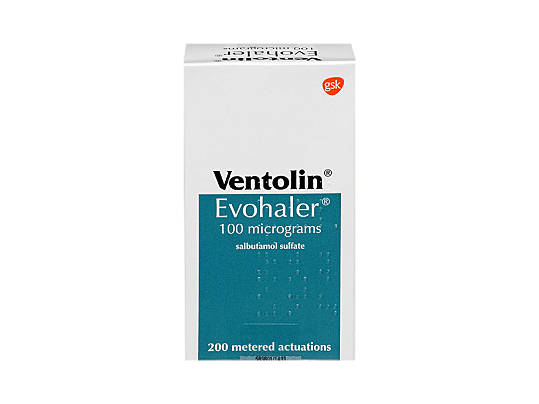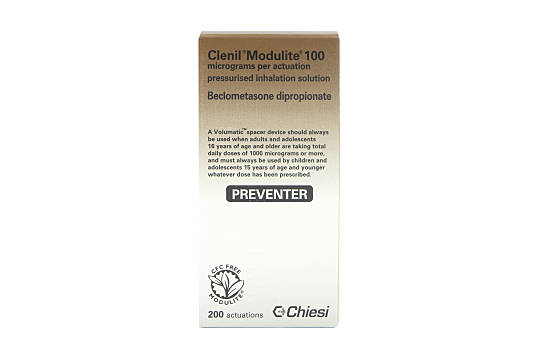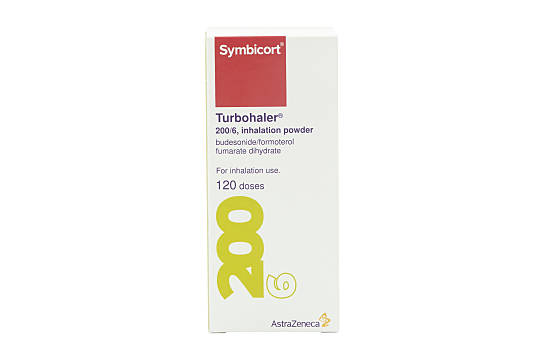Asthma Inhalers
Asthma inhalers are used to treat and manage the symptoms of asthma, such as coughing, wheezing and difficulty breathing. Request a prescription for your inhaler online from ZAVA and get fast, free delivery.
Prices from £11.95
Simply fill in a brief consultation questionnaire and one of our doctors will review your request today.
Inhalers are the main way to treat symptoms of asthma, like wheezing and shortness of breath, and to prevent an acute asthma attack.
The 3 different types of inhaler are:
- reliever inhalers, which stop the symptoms as you experience them
- preventer inhalers, which work to stop symptoms developing in the first place
- combination inhalers, which use the medication in both types to control your asthma when your preventer inhaler is not working well enough
Please note, if you need a generic (non branded) inhaler, the box your inhaler arrives in may look slightly different but this should not affect your medication. This may look different because we use a range of manufacturers to ensure we always have enough stock for patients. If you have any questions, you can message our doctors through your account.
Asthma inhalers
In stock. Prices from £11.95
In stock. Prices from £12.95
In stock. Prices from £22.95
In stock. Prices from £22.99
In stock. Prices from £49.95

In stock. Prices from £34.95

In stock. Prices from £29.95

In stock. Prices from £34.95

No results found.
Please check your spelling or try another treatment name.



About asthma inhalers
-
-
Reliever inhalers
Reliever inhalers are used to quickly stop your asthma symptoms and prevent an asthma attack. These inhalers contain drugs called bronchodilators, which relax the muscles in your lungs and let more air in, helping you to breathe more easily.
Ventolin is a well known brand of reliever inhaler. Salbutamol inhalers contain the same generic medicine as Ventolin and are usually cheaper as they are not a branded medicine. Reliever inhalers are usually blue.
Preventer inhalers
Preventer inhalers are used daily to reduce the chance of having an asthma attack. These inhalers are sometimes called ‘steroid inhalers’ as they contain steroids that reduce the inflammation in your airways. These steroids are not like those used by bodybuilders. Instead, they are copies of steroids that your body can produce naturally.
Your doctor will advise you how often to use your preventer inhaler but it is usually twice a day (morning and evening). When you first start using a preventer inhaler it can take two weeks before you notice the impact.
Preventer inhalers are usually brown, but sometimes red or pink. At ZAVA we can prescribe you Clenil Modulite and Soprobec.
You cannot use a preventer inhaler to stop the symptoms of an asthma attack as they happen.
Combination inhalers
Combination inhalers contain two types of medicine: bronchodilators and steroids. They are used as an additional treatment if your usual preventer inhaler is not working well enough. They contain long-acting bronchodilators, which together with steroids work over a more extended period to relax the muscles in your lungs and reduce inflammation in your airways.
Combination inhalers prevent your asthma symptoms from developing in the first place and do not replace your reliever inhaler. Reliever inhalers contain fast acting bronchodilators, which work quickly to stop your asthma symptoms.
If you are already using a combination inhaler, our doctors can prescribe you the combination inhaler Symbicort. Symbicort is a red inhaler.
-
-
Your doctor will tell you how many puffs to take and how many times a day. If you find you need to use your inhaler more often than your doctor has prescribed, talk to them.
Follow these steps to make sure you are getting the medication from your inhaler:
- Make sure you are sitting or standing upright.
- Take off the mouthpiece cover and check it is clean.
- Shake the inhaler a few times.
- If it is a new inhaler or one you haven’t used for 5 days, press the canister to release 1 or 2 puffs into the air, so you know it is not empty.
- Hold the inhaler up with your thumb at the base just below the mouthpiece.
- Breathe out.
- Rest the mouthpiece between your teeth and be careful not to bite it. Make a tight seal by closing your lips around the mouthpiece of the inhaler.
- Breathe in.
- Press down on the top of the inhaler.
- Breathe deeply and steadily as the inhaler releases a puff of medicine.
- Hold your breath for as long as you are comfortable so the medication can get into your airways.
- If the doctor has told you to take two puffs, wait 30 seconds before repeating the process.
- Replace the mouthpiece cover right away.
If you find it difficult to breathe while using the inhaler, your doctor can advise you on using a spacer.
How to use a reliever inhaler
Use your reliever inhaler as soon as you notice asthma symptoms such as wheezing, breathlessness, chest tightness, and coughing.
You can take 1 or 2 puffs up to a maximum of 4 times in any 24 hours and your asthma symptoms should improve. If they do not or you need to use your inhaler again less than 4 hours after this, you should seek urgent medical advice. If you feel your symptoms are under control and know what to do, you can call your GP. If you are worried about your symptoms and your inhaler is not helping, call 999. Do not delay getting medical help when you are having an asthma attack.
If you know that exercise or certain substances (for example dust, pollen, or animal hair) trigger your asthma, you can use your reliever inhaler 10 to 15 minutes before to prevent symptoms from developing.
How to use a preventer inhaler
Use your preventer inhaler every day as directed by your doctor. Most people use it twice daily, once in the morning and once in the evening.
You must continue to use your preventer inhaler even if you think your asthma is under control. This is because it builds up protection in your airways over time.
How to use a combination inhaler
Your combination inhaler works to prevent your asthma, so is used in the same way as a preventer inhaler. Always follow your doctor’s instructions and consult with them before making changes to your asthma medication.
-
-
It is essential to look after your inhaler so that you know it will work when you need it. You should test it and clean it every week.
- Take the metal canister from its casing and put it to one side. Do not put the canister in water.
- Remove the mouthpiece.
- Hold the plastic casing under the hot tap and run warm water through it.
- Dry the casing carefully.
- Put the metal canister and mouthpiece on again.
- Shake the inhaler and spray it into the air once to make sure it works.
-
-
As with all medications, side effects are possible from using inhalers. The symptoms and how serious they are can vary from person to person. If you use your inhaler as directed and with the right dose, you should not have any side effects.
Side effects from reliever inhalers
If you experience your heart beating faster (tachycardia) or stronger than usual (palpitations), talk to your doctor right away.
Common side effects (may affect 1 in 10 people) include:
- headache
- feeling shaky
Uncommon side effects (affect 1 in 100 people) include:
- muscle cramps
- mouth and throat irritation
Rare side effects (affect 1 in 1000 people) include:
- peripheral dilatation (increased blood flow to your extremities)
- a low level of potassium in your blood
Side effects from preventer or combination inhalers
People who use a higher dose of a steroid inhaler over a longer period of time can have side effects similar to those from taking steroid tablets. These include difficulty sleeping, mood changes, and an increase in appetite.
Common side effects (may affect more than 1 in 10 people) include:
- thrush in the mouth and throat
- hoarse voice
- sore throat or tongue
Uncommon side effects (may affect up to 1 in 100 people) include allergic reactions like:
- skin rashes
- hives
- itching
- redness
Very rare side effects (may affect up to 1 in 10,000 people) include:
- swelling of the face, eyes, lips and throat
- changes to the normal production of the steroids in the body
- weakening of bones
- eye problems such as cataracts and glaucoma (increased pressure in the eye)
-
-
You need a prescription to get an asthma inhaler. This means you cannot buy any inhalers over the counter.
-
-
There are other medical asthma treatments if your inhalers are not working for you. These include tablets such as leukotriene receptor antagonists (LTRAs), theophylline and steroids in tablet form.
People with very severe asthma may be prescribed injections every few weeks.
Some people recommend complementary therapies such as acupuncture, homoeopathy, dietary supplements, ionisers, and traditional Chinese herbal medicine. According to the NHS, there is little evidence that these treatments help.
Breathing exercises such as the Papworth method and Buteyko method have been found to help improve symptoms and reduce the need for reliever medication in some people. These should not replace your medicine.

Dr Kathryn Basford is a qualified GP who works as a GP in London, as well as with ZAVA. She graduated from the University of Manchester and completed her GP training through Whipps Cross Hospital in London.
Meet our doctorsLast reviewed: 11 Jan 2022
-
Asthma, National Health Service [accessed December 2021]
-
Preventer Inhalers, Asthma.org [accessed December 2021]
-
Combination Inhalers, Asthma.org [accessed December 2021]
-
Steroid Inhalers, National Health Service [accessed December 2021]
-
Asthma, chronic, NICE/British National Formulary [accessed December 2021]










